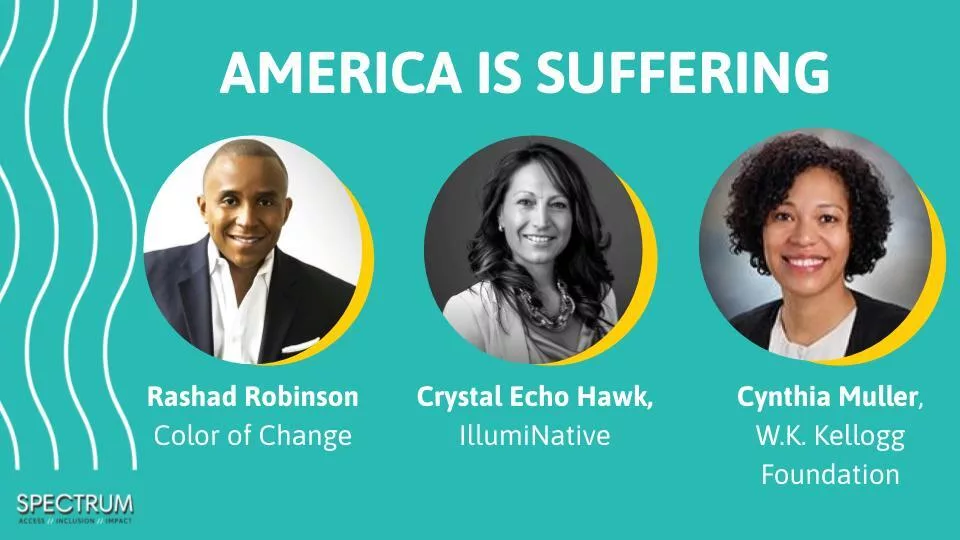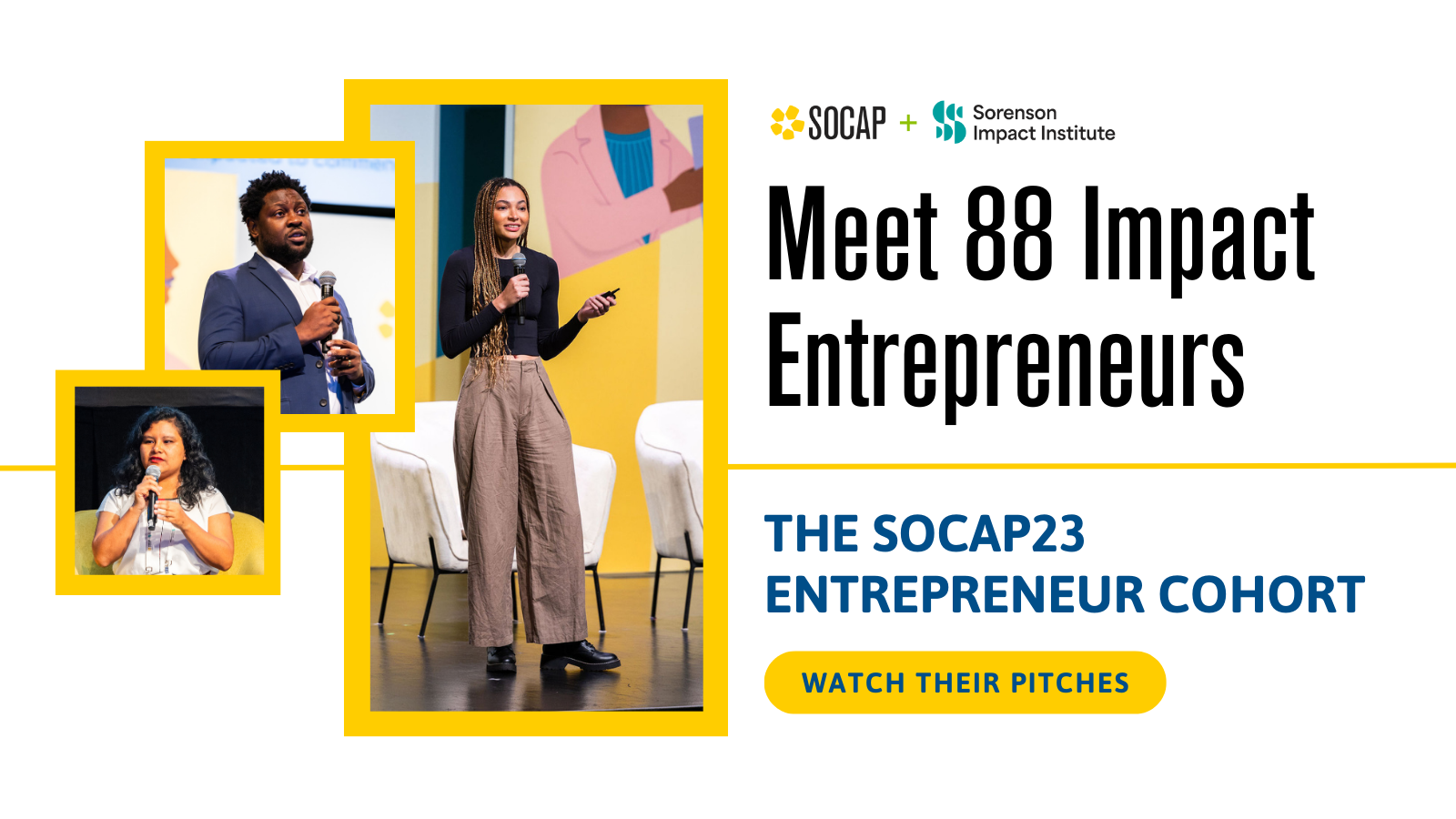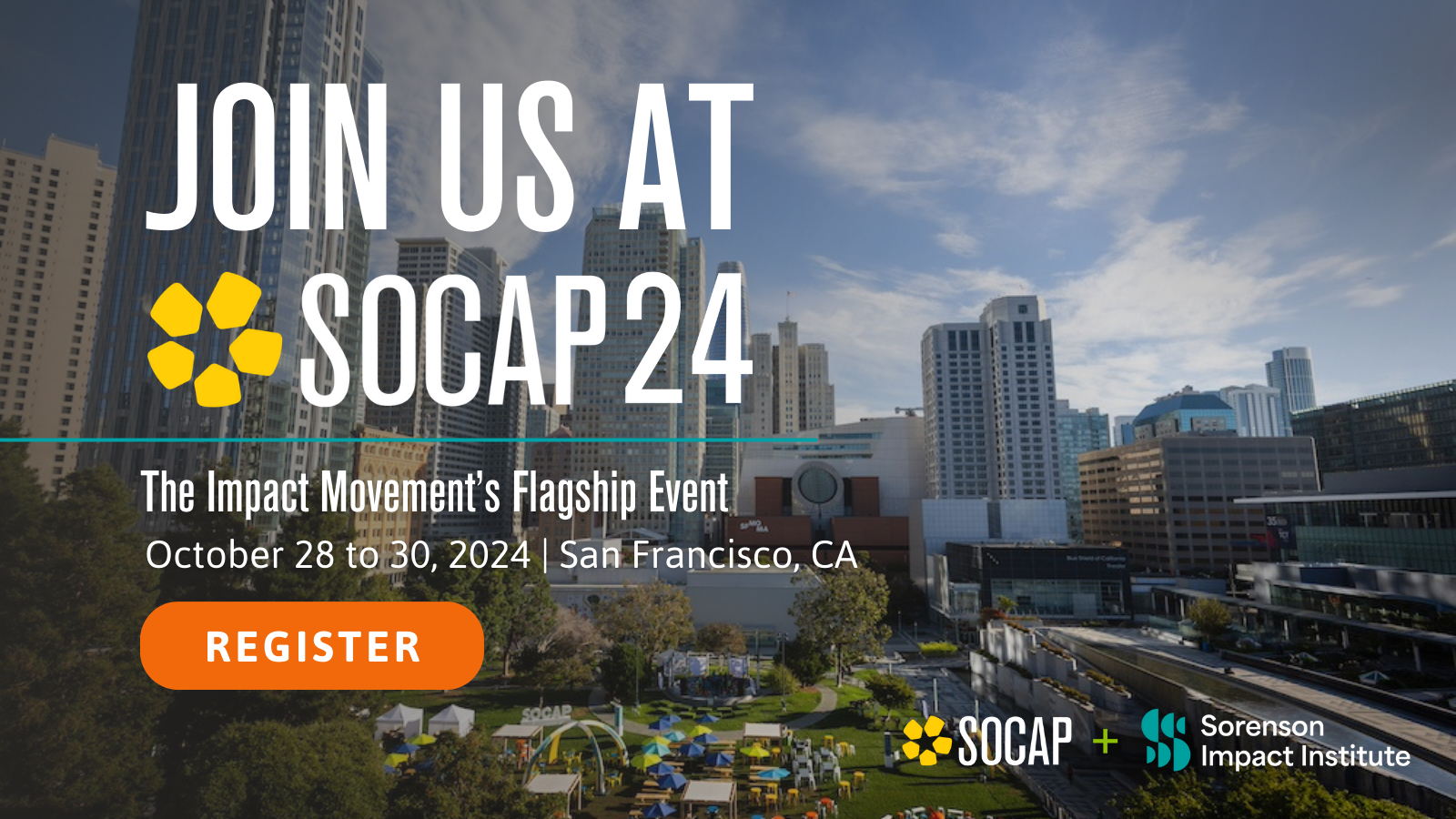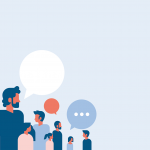Put the Focus on Systems Change to Get at the Root of ‘How America Is Suffering’
When it comes to systemic problems, there is a tendency to speak about them as passive forces. Identifying these systems as actively perpetuating harm on certain communities is crucial to actually reform the systems.
“We will say, ‘Black people are less likely to get loans from banks,’ instead of saying, ‘Banks are less likely to give loans to Black people,’” said Rashad Robinson, President of Color of Change. “Then what we do is we spend all of our time with financial literacy programs for Black people to help fix us, to get us into a system that is actually systemically excluding us. We don’t force the system to actually have to change, we put the energy on people.”
This SPECTRUM session examines the ways in which systemic issues are perpetuated and delves into solutions that can be amplified, especially in this moment of national reckoning around racial justice. Panelists include:
- Rashad Robinson, President of Color of Change
- Crystal Echo Hawk, Founder of IllumiNative
- Cynthia Muller, Director of Mission Investments at W.K. Kellogg Foundation
Watch the full session or read the transcript below.
Watch Rashad Robinson, Crystal Echo Hawk, & Cynthia Muller in ‘How America Is Suffering’
Cynthia Muller: On a personal note, this is really special to me as a Black Indigenous woman. In this moment hearing Indigenous people, Black people, and their voices getting heard, Rashad and Crystal you both lead organizations that really are focusing on relevating those voices and helping broader communities to understand how to engage with the issues that folks are becoming more and more aware of. Crystal I’ll start with you, talk a little bit about IllumiNative, how you’re thinking, the ethos of IllumiNative and what you guys are up to in this time.
Crystal Echo Hawk: Yeah, definitely. Well, thank you so much. It’s so good to be here and thanks to SPECTRUM for inviting me. And I first want to start off and just say, Rashad, it’s good to see you, and I’m sending you good thoughts. I feel like every time I turn on the TV, you are there and I just hope that you’re finding some time to sleep and take care of the work that you and Color of Change are doing, it’s beautiful, it’s powerful, it’s needed. And I bet you’re tired.
So, really IllumiNative was founded based on a body of research. It was the largest public opinion research project ever done about Native Americans. We wanted to get into the minds of the American public and understand what are the dominant narratives about Native peoples, what are those perceptions, and how do those perceptions that non-Native people have about Native people impact us? It’s called the Reclaiming Native Truth project. Nadia was actually our founding program officer at Kellogg. Kellogg was our angel investor in that work.
And really what that work showed us is that invisibility is the greatest threat in many ways to Native peoples and that nearly 80% of Americans know little to nothing about us. 72% of Americans never even encounter information about us on a daily basis. And what that causes is that nearly two thirds of Americans don’t even think we face discrimination, which doesn’t line up with the fact that we, like our African American relatives, win the races we don’t want to win when we talk about health disparities or the fact that proportionately to our population, Native Americans die at the hands of police at some of the highest rates in the country.
And so really, as we founded IllumiNative and began to understand the power of invisibility to feel bias and racism and discrimination, we really began to see it was a system wide issue that’s perpetuated in media and entertainment, K through 12 education, our systems of government. And it’s really institutionalized in terms of not only our ratio but that systemic racism that’s really what’s embedded and permeates every level of our society. And so, really IllumiNative’s mission has really been about calling out those systems of racism and discrimination that are impacting native peoples today.
And now more than ever in this moment, we stand with our African American brothers and sisters, and we feel it. And I feel angry every time I see a white person get on TV and say that systemic racism isn’t an issue in this country. And it permeates every level of our society, and I’m also at the same time just so moved and called to action with so many who are taking to the streets that I think we’re really in an incredible moment for change
Cynthia Muller: Rashad, I know I’m not Oprah, but I try to be in my spare time. But Color of Change, you guys are really driving a lot of the conversation and really helping to amplify the real issues that are going on here. What are you guys up to right now? How are you guys managing all of the incoming right now, especially around so many voices wanting to be heard right now?
Rashad Robinson: Yeah, Oprah called me, and I don’t answer blocked calls, so she left a message which was actually great because I could at least play it for my mom. And so, there was that sort of moment. But all of that aside, part of what we try to do with all of this work is we talk about translating presence into power. And what does that mean? It means that visibility and awareness, that retweet stories in the front of the page are not enough if we don’t have the ability to change the rules. America can love Black culture and hate Black people at the same time. And so, we can’t mistake a Black president for the ability to actually end systemic racism. All of those things, presence is important, visibility is important, awareness is important, but far too often we stay there.
And so, what we are really focused on is how do we drive as much energy towards a strategic action. If you had talked to me three weeks ago, I would have told you 1.7 million people have taken action with Color of Change in the last eight months and that would have made us the largest online racial justice organization in the country, it would have made us have the largest digital footprint in terms of email lists and being able to actually move people up a ladder of engagement out of any racial justice organization. Today I can say over seven million people have taken action with us in the last eight months. That is an incredible, unprecedented amount of growth in terms of people wanting to take action.
And what we hold a real high standard about is what kind of action is actually strategic? How do we actually drive people towards things that will change? And so when I talk about narrative change I am really talking about the rules and norms of society. What is acceptable and wanted, and what is possible on the other end? White people taking off their cell phones now in a Starbucks and filming something and knowing that they’ve got to send it in because a movement has changed their context. And then how do we then translate to actual systemic rule change at corporations? How do we change that rule in terms of how police engage? How do we change that in terms of having elected a district attorney in Philadelphia that now doesn’t prosecute in that situation because there’s been a new set of power and a new set of dynamics created?
And so, we’re constantly thinking about how do we channel that energy? How do we make good on that energy? And so, the thing I will say before we continue is when we’re talking about this moment around criminal justice, as we’re talking about policing, for the last 20 years in this country, violent crime has steadily gone down. But according to Pew and others, most Americans think that violent crime is going up. So here is where we talk about narrative, not just stories out in the world but the gap between perception and reality. And the gap between perception and reality creates all sorts of demands for a type of policing that is unnecessary. It dis-incentivizes investments that we should actually have. It creates a hostile climate. And so then how do we then deal with it?
And so, at Color of Change we very much think about narrative infrastructure and I’ve done a lot of writing about narrative infrastructure. You could find some of that at colorofchange.org/narrativepower. And there you can see some of the ways in which we’re really talking about how do we actually build the infrastructure to control the way our stories are told? And so, that means that we’ve got to control and deal with the rules as social media platforms. We have to deal with the rules and how stories are told in news. We have to engage Hollywood and deal with the rules of how stories are told.
Cynthia Muller: Investment committees too.
Rashad Robinson: Yes. All of these places. And so to that point, over the course of the last two weeks I’ve gotten more calls from corporations, I mean more unsolicited calls I should say. Sometimes they call me back when we call about campaigns, but I’m getting calls, I’m waking up to announcements from corporations saying they’re giving us money that I have active campaigns against. And I’m like, “No, you’re not giving us money, but I would love to get on the phone with you.” And CEO, now that you want to talk, I’ve got some things I need you to do. And so all of that to say there is this moment, there is this context. I write a monthly column, monthly recently because I haven’t delivered, but I just published today and I talk a lot about the intersection between race, politics and corporate power. And really trying to go back to this idea of not mistaking presence for power, not allowing Black Lives Matter hashtags to lead the day but actually allowing the actions that actually make Black Lives Matter be this framework for what we accept.
Cynthia Muller: That’s right. And so that’s a question for how do we take folks who are just coming to understand the narratives, how the narratives have been presented and the reality? So we’re raising up Native, Black, Latinx people. All these different groups are starting to have a voice around the narratives. How can those of us who are here as investors, as social enterprises, entrepreneurs, individually, so Nadia talked about good intention folks, so how do we start to learn about these histories and really steep ourselves in this so we don’t get in your ways? Crystal, do you want to take that?
Crystal Echo Hawk: Yeah. I mean I think for one, It’s turning over the mic. It’s creating space for those conversations and understanding that you will be uncomfortable. And this is really the moment to sit back, to listen, to create the space, to really understand the role that systemic racism plays. And when we talk about real things like white supremacy and understanding who is really controlling these different rules, these norms, all of these systems that Rashad just talked about. We have to look at it. It’s not just one place that we’re going to find it. These dominant narratives, these things are being perpetuated by large-scale systems in this country, and we have to have a reckoning. And there has to be a reckoning in this country and in this moment that this country is built on stolen land, it’s built on stolen bodies and stolen labor.
And when we went out and we did our research so many Americans we talked to said, “You know what? All of that happened a long time ago. That’s a long time ago. Everybody needs to get over it.” But what we saw play out on the streets of Minneapolis, what we see happened with Ahmaud Arbery, when we see the same officer that killed George Floyd killed a tribal citizen. This is going on and on and on. This is not new. This has been happening. It’s just — thank God — that now cell phones have video cameras, and there is that culture shift, there’s that norm shift that people are pulling out their phones. But it is really that recognition that this isn’t going away, that this is the reckoning that needs to happen, and it’s good for everyone. But it is really about the intentionality of not just corporations standing up and the hypocrisy that came out on Blackout Tuesday with so many different corporations who are out there like the Washington football team saying, “We don’t support racism,” when their team name is a dictionary defined racial slur.
So Roger Goodell, NFL, you know what? You made one small step. You should’ve apologized to Colin Kaepernick. It should go a lot further than that, but if the NFL and all of these professional sports teams and so many are really committed to ending systemic racism, then their words need to be more than just these hollow words that they put out on social media. This really comes with every aspect of it which includes the racism that Native Americans have faced at the hands of professional sports or the way that Native Americans are erased within media and entertainment.
Even though we see these instances of police violence and other things happening in our communities they’re not covered, even by the admission of the media in terms of Native Americans. So in this moment, we really need a conversation around racial justice and about ending systemic racism that is really all inclusive. And we need our white allies, we need those folks to step back and create space and hold space in this moment and to listen to the people that are closest to the pain that really understand. And I really think in that way and with that great intentionality, and it’s going to be uncomfortable, that that’s the way we’re really going to start to see the change.
Cynthia Muller: Yeah, I was just going to echo on your point there Crystal that it’s also about us individually understanding our own power and the way that the power flows within our respective systems. So for instance, for us and investments where I’m sitting, it’s like how investors don’t recognize their power and how that can perpetuate in a personal, structural violence through, “You’re not good enough to be in our fund,” or even making folks jump through a tremendous number of hoops to get to a no. I’ve seen this time and time again. And so I’m curious, Rashad, as we think about our individual sectors that we all represent, how do we start to change these narratives from the inside out?
Rashad Robinson: Yeah. I really want to pick up off of where Crystal was going because I think it’s just incredibly important actually when folks have been asking me, “What are some of the worst displays of corporations?” I always use the Washington football team as one of my examples of a good…
Cynthia Muller: That’s a good go-to.
Rashad Robinson: Yeah. I mean, well just being part of the NFL in and of itself and then the years and years of campaigns and some of just the work I have done in very, very small ways to help at different times advise folks who have been trying to run campaigns or give some support. But I want to give you all some things that you can do now.
First, we have to stop telling stories that are unfortunate and start telling stories that are unjust. When we tell stories that are unfortunate like a car accident, like it just happened, there is no one to blame, there’s no systems at play. We give people permission to move forward with charitable solutions to structural problems. We give people too much credit for simply sending water bottles to Flint instead of forcing corporations to pay their fair share of taxes so these folks actually have clean pipes. That we give people credit for doing service days at inner city schools instead of recognizing that our tax structure, which has been built upon so many years of racism, of austerity, of economic choices, that it is not an accident that these schools are this way. And it has been a choice of our government, and we can’t simply give credit for mentorship days at inner city schools, we actually have to change the schools. Charitable solutions to structural problems is what we end up getting when we tell stories that are unfortunate rather than unjust.
We far too often talk about Black communities, Indigenous communities, communities of color, women, poor folks all the time as vulnerable. I am vulnerable sometimes. When I see an ex that’s too happy on social media I’m vulnerable. That’s when I go do something personal for myself. I have to call my therapist to work it out, so I’m not doing something. That’s an individual thing that I’ve got to work on — that’s vulnerability. Black communities are not vulnerable, we’ve been attacked. We have been targeted. We have been exploited.
When you talk about our communities as vulnerable then the energy goes to fixing our communities and our families, not fixing the structures that actually put us in harm’s way. It’s this way in which we use a passive voice for systems and an active voice for people when in fact, if you actually want to solve these problems, we have to put the active voice on the systems that harm us. We will say things like, “Black people are less likely to get loans from banks,” instead of, “Banks are less likely to give loans to Black people.” We will say indigenous are less….
Cynthia Muller: Can you say that again for the folks in the back?
Rashad Robinson: We will say, “Black people are less likely to get loans from banks,” instead of saying, “Banks are less likely to give loans to Black people.” Then what we do is we spend all of our time with financial literacy programs for Black people to help fix us, to get us into a system that is actually systemically excluding us. We don’t force the system to actually have to change, we put the energy on people. We will say, “Indigenous folks, Black folks, women are less likely to get hired by tech companies,” instead of saying, “Tech companies are less likely to hire us.” Then we ended up with, “Let’s do mentorship programs so these folks are ready to get inside of systems that have been designed to exploit, keep them out, target them.” We do this all the time in terms of what we put our energy into.
Finally, I want to say that we are in a deep moment of cultural and political change where I believe inflection points are those things where we can go radically forward or move radically backwards. And part of that is that we can’t just talk about Black people in this moment and talk about the pain and talk about the struggle. Yes, that’s sometimes how the activism comes, but I want to be really clear that Black people, Indigenous folks, we are the protagonist in the American story.
No one has fought harder to get educated and vote in this country than Black people and had to do it in the face of so much struggle. And I just simply need to make sure that we are constantly — just as we are talking about policing, as we are talking about these moments of Black pain — that we are also centering Black brilliance, Black creativity, Black joy, in this moment. Black joy is not the absence of pain, but it’s the presence of aspiration. It’s not just what we are fighting against but what we are fighting for.
When I agreed to this, I think we were in the COVID age, where that was the main story, and we were talking about the ways in which we were seeing all of the failures of our government, the targeting of our government on Black folks come to bear as this disease ripped across. And we weren’t seeing nearly enough of it when we talk about our Indigenous brothers and sisters in terms of the invisibility of all of the ways in which they’ve been exploited by the targeting and austerity that’s happened on both Indigenous lands and non-Indigenous lands in terms of the healthcare disparities. Both of those things are very clear, and those stories are different, and as a result, the levers are different.
But I say that to say that Black people were at the front lines of being essential workers providing the kind of tools, food, resources that we need. We created some of the most joyful and hopeful spaces on Instagram Live and on social media that helped people get through this struggle. If we only can tell stories of pain and not tell stories of hope, aspiration and joy, we don’t actually build the energy for us to fight for a better tomorrow.
So, I just say that, as we think about what we can do today, there are things that all of us are doing in the stories that we tell and the language that we use that incentivize the wrong things, that put the focus on the wrong type of action and narrative. If it is the rules and norms of society, what is acceptable and what is possible, then we have to raise the floor on what’s acceptable and push up the ceiling on what’s possible. Shifting the rules on what we can demand and what we should have and all of that has to do with how we engage as much as how the rest of the world does.
Cynthia Muller: That’s right. Thanks Rashad. I think for folks in our field and philanthropy and investment. We’re trying to create entirely new value systems and conversations. And so for me, I know I’m committed to working on making sure how we are included in communities. Because we all make choices every day, and we have some choices that we can make that are better than others for communities and others that are not. And I think that in context of these conversations with you both, it’s going to be on all of us to really look at those decisions we’ve made and if those are decisions we want to make in the future.
I’m going to turn it over to Crystal and Rashad for some closing remarks. So you are allowed two next steps for folks on the call. Obviously your websites are incredible resources, but what else can folks do to work on themselves so they can understand these narratives?
Crystal Echo Hawk: I just really want to tag on to what Rashad was saying about the power of these stories, these dominant narratives about Black and Indigenous peoples. And the prevailing narrative about Native peoples is that we are broken, and we are a problem to be solved, and we require a savior to come in and fix us. And that has been the narrative that played out all throughout COVID-19. Instead of recognizing, actually, tribal nations overall have managed to keep their COVID cases down, despite the systemic and massive failures of the federal government to really stand up to its obligations to Native peoples and, I think, to all peoples. I mean, COVID laid bare the gross inequities in the system of which people of color, Indigenous peoples are the ones that are right in the bullseye, that are suffering the most because of these systemic issues and failures.
And so, it’s really beginning to understand the power of those stories and particularly with regard to Native peoples’ — that we’re a problem to be solved or we just don’t exist — that is rampant throughout philanthropy in this sector. That is part of the problem. There’s power in saying recognize that is part of the problem. Rashad and I were at another conversation not too long ago, and I was sharing that I spoke to a program officer at the height of COVID saying, “We need resources because invisibility is a matter of life or death during this pandemic. We need to get resources out so that we can really put them to work in Indian country.” And was literally told that that foundation had already funded another Native project, it might fund one more, and that was this cap within.
Now I know this person to be a good person, but I know that she’s also operating within a system, within philanthropy and knowing that less than eight percent of communities of color and Indigenous peoples get foundation dollars. If you want to help, have a real reckoning to look at the way that all of these things, including within the space of philanthropy and when we talk about investment, how it’s perpetuating some of these things. And there is such an amazing opportunity to turn to look to Native peoples not as a problem to be solved but partners at the table around real solutions. That, yes, to celebrate also Native joy, Native brilliance, Native innovation. There are so many good things happening, but yet nobody wants to let us out of that box of disparity, and we are ready. It is happening. We are breaking through.
Standing rock was the signal of that and the power that Native people are building and we will be at the table. We are going to be a force that we want to join forward and when it comes to the election this fall. In those seven critical battleground states, the Native vote is going to be incredibly important. And we are so excited, the Indian country is so excited to stand shoulder-to-shoulder with everyone that wants this change. So I guess my final point would be, come follow us on IllumiNative, be a part of these calls to make the Washington football team finally change the name, to have the level of accountability to bring down statues of Columbus and all of these other symbols of hate and racism in our country. That is a beginning and just the work that you can do within your own space and job.
Cynthia Muller: Thank you Crystal. Rashad, close us out.
Rashad Robinson: I think we’re seeing a lot on the news right now and I think it’s really important that we remember that people don’t experience issues, they experience life. The forces that hold us back are interrelated, political inequality goes hand-in-hand with economic inequality. A racist criminal justice system requires a racist media culture to keep it alive, to keep it sustained, to create the demand for it. And all of those things operate together. And so, there are no silver bullets to dealing with structural inequality and structural racism. What I know is that what we need is power. We do not have a lack of ideas, our movement has tons of ideas. Some are more aspirational than I’m ready and maybe my members are ready to fight for. Some are way too reform based.
So it’s not the question of ideas and innovation, it is the question of power. And so the question is what do we do together to build the power to actually change those rules long term? So I guess I just want to welcome you to join us. Visit colorofchange.org/narrativepower and download some of the writing. We have more coming out.








